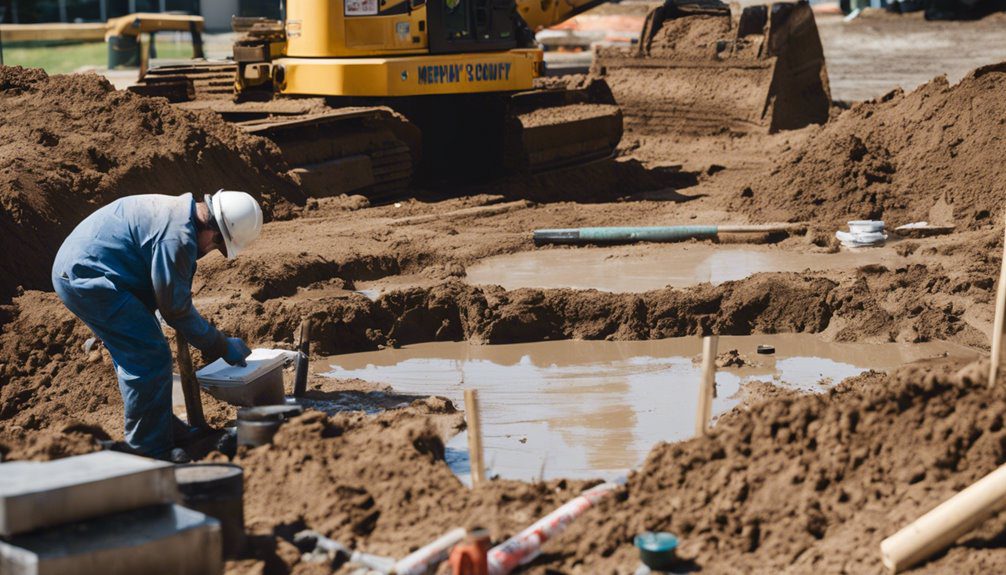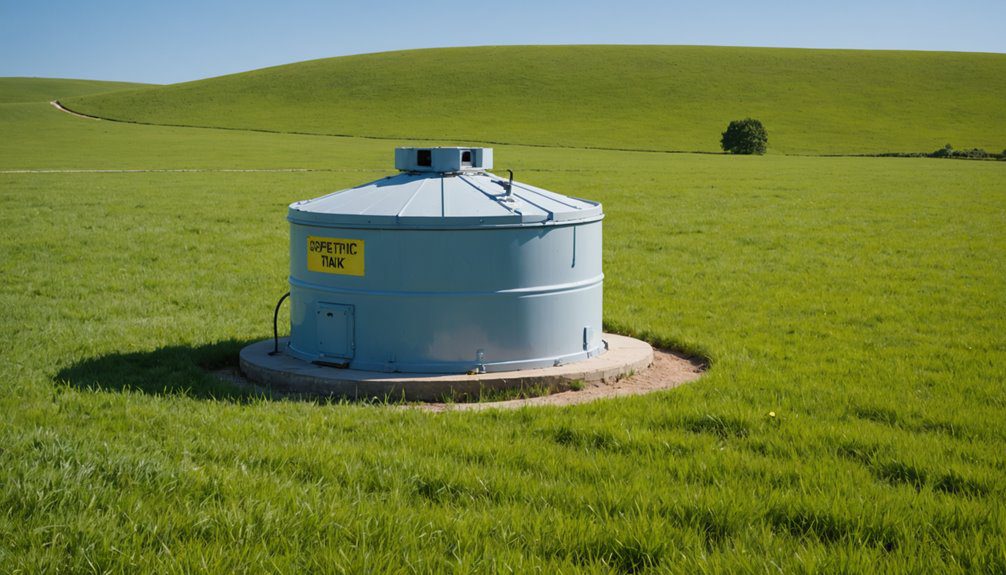When considering a septic system installation in Memphis and Shelby County, you'll want to understand the importance of the Installer Bond. This bond not only protects you financially but also ensures that installers comply with local regulations. You might be wondering what the specific requirements are for obtaining this bond and how it can impact your decision-making process. Plus, there are key benefits and responsibilities that both you and the installers need to know about. Let's explore what this means for your project and what you should keep in mind.
Importance of the Installer Bond

When it comes to installing septic systems, the importance of the installer bond can't be overstated. This bond acts as a safety net for you, providing financial protection in case something goes wrong during the installation process. If the installer fails to meet the agreed-upon standards or if there are any damages, you can rely on the bond to cover the costs. This assurance gives you peace of mind, knowing that your investment is safeguarded.
Moreover, having an installer bond signifies that the contractor is committed to following local regulations and industry best practices. It shows you that they take their responsibilities seriously and are willing to stand behind their work. A bonded installer is often more reputable, which can save you time and stress in the long run.
In addition, if you ever encounter issues with the septic system after installation, the bond can serve as a financial resource for any repairs needed. It's not just a piece of paper; it's a vital part of ensuring that your septic system is installed correctly and efficiently. Additionally, it helps to ensure compliance with local regulations that are necessary for proper installation and operation.
Requirements for Obtaining the Bond
To secure an installer bond, contractors must meet specific requirements set by local authorities. First, you'll need to provide proof of your business registration and relevant licenses. This ensures that you're authorized to operate in Memphis and Shelby County.
Next, you'll often have to submit an application form, detailing your experience in the septic system installation field. Most likely, you'll also need to provide a financial statement or proof of your creditworthiness. This helps local authorities assess your ability to fulfill contracts and obligations.
Additionally, some jurisdictions may require you to undergo a background check to confirm your business practices. You must also pay a bond premium, which varies based on the bond amount and your credit history. The bond amount typically reflects the financial risks associated with your work, so be prepared for this cost.
Lastly, ensure you've reviewed and understood all local regulations regarding septic systems, as compliance is crucial for obtaining and maintaining your bond. By following these steps, you'll be well on your way to securing the installer bond you need to operate legally and effectively in your area.
Benefits for Homeowners

Understanding the benefits of hiring a bonded septic system installer can significantly impact your peace of mind as a homeowner. When you choose a bonded installer, you're ensuring that they've met specific legal and financial requirements, which provides an extra layer of protection for you. This means you can trust that they possess the necessary skills and knowledge to handle your septic system installation correctly.
Additionally, if any issues arise during or after the installation, the bond offers a safety net. Should the installer fail to meet the agreed-upon standards or cause damage, you may have recourse to recover losses, making it a smart financial decision. This can save you from unexpected repair costs that can arise from shoddy work.
Moreover, hiring a bonded installer often means they're more committed to complying with local regulations, ensuring your septic system meets all codes. This compliance helps avoid future legal complications, allowing you to enjoy your home without worry.
In short, a bonded septic system installer not only safeguards your investment but also enhances your confidence in the quality of work being performed. You deserve that peace of mind as a homeowner.
Responsibilities of Installers
A bonded septic system installer has several key responsibilities that ensure your installation goes smoothly and meets all necessary standards. First, they must conduct a thorough site evaluation to determine the best location and type of septic system for your property. This includes assessing soil conditions, water table levels, and zoning regulations.
Once the site is evaluated, your installer will obtain the necessary permits from local authorities. They're responsible for adhering to all local, state, and federal regulations throughout the installation process. This ensures that your system is compliant and functions effectively.
During installation, the installer must accurately follow the approved plans and specifications. They should also communicate with you about the process, helping you understand what to expect and answering any questions you might have.
After the system is installed, your installer will conduct a final inspection to ensure everything is functioning properly. They'll also provide you with maintenance guidelines to help you keep your system in good working order.
Common Issues and Violations

Common issues and violations can arise during the septic system installation process, impacting both functionality and compliance.
One common problem is improper site selection. If the location isn't suitable, it can lead to system failure and environmental harm. You might also encounter issues with incorrect sizing of the septic tank or drain field, which can cause overflows or backups.
Another frequent violation is failing to obtain the necessary permits. Skipping this step can lead to hefty fines and force you to redo the installation. Additionally, not following local codes and regulations can result in significant penalties—you've got to stay informed about the specific requirements in Memphis and Shelby County.
Improper installation techniques are also a concern. For instance, if the tank isn't level or the connections aren't sealed correctly, you may face leaks or system malfunction.
Lastly, neglecting to conduct regular inspections and maintenance can lead to serious problems down the line. By being aware of these common issues and violations, you can help ensure a successful septic system installation that meets all necessary standards.
How to Verify Installer Credentials
Before hiring a septic system installer, it's crucial to verify their credentials to ensure you're making a sound investment.
Start by checking if the installer is licensed in your state. A valid license indicates that they've met the necessary training and regulatory requirements. You can usually find this information on your state's licensing board website.
Next, confirm that they've liability insurance. This protects you in case of accidents or damages during the installation process. Request proof of insurance, and don't hesitate to call the insurance company to verify its validity.
Also, look for any certifications or memberships in professional organizations, like the National Association of Wastewater Technicians.
These credentials can indicate a commitment to ongoing education and industry standards.
Steps to File a Claim

Once you've verified the installer's credentials and completed the installation, you might find yourself needing to file a claim at some point.
To start the process, gather all relevant documentation, including your contract, receipts, and any correspondence with the installer. This information will help support your claim.
Next, contact the bonding company that issued the installer's bond. You can usually find their contact information on the bond itself or through the installer's business details.
When you reach out, clearly explain your situation and provide the documentation you've collected.
It's important to file your claim as soon as you notice any issues. Be prepared to describe the specific problems you're facing and how they relate to the installer's work.
After submitting your claim, the bonding company will review it and may conduct an investigation. They might contact you for additional information, so stay cooperative and responsive.
Once the review is complete, the bonding company will inform you of their decision. If the claim is approved, they'll arrange for compensation as outlined in the bond's terms.
Keep a record of all communications throughout the process for your reference.
Conclusion
In conclusion, securing the Memphis and Shelby County Septic System Installer Bond is essential for both you and your installer. It not only ensures compliance with local regulations but also protects your investment and health. By choosing a bonded installer, you gain peace of mind, knowing there's a safety net if something goes wrong. So, always check for the bond and stay informed about your rights and responsibilities when it comes to septic system installations.


